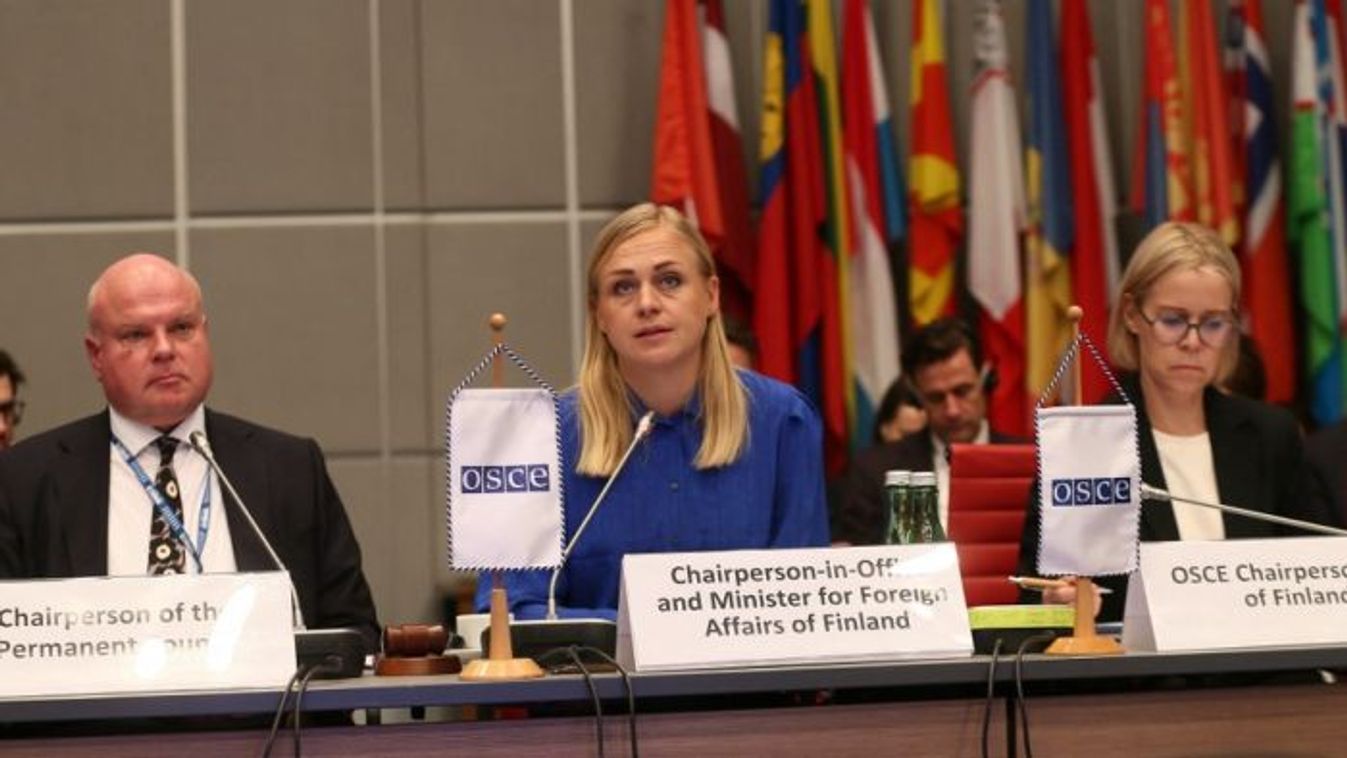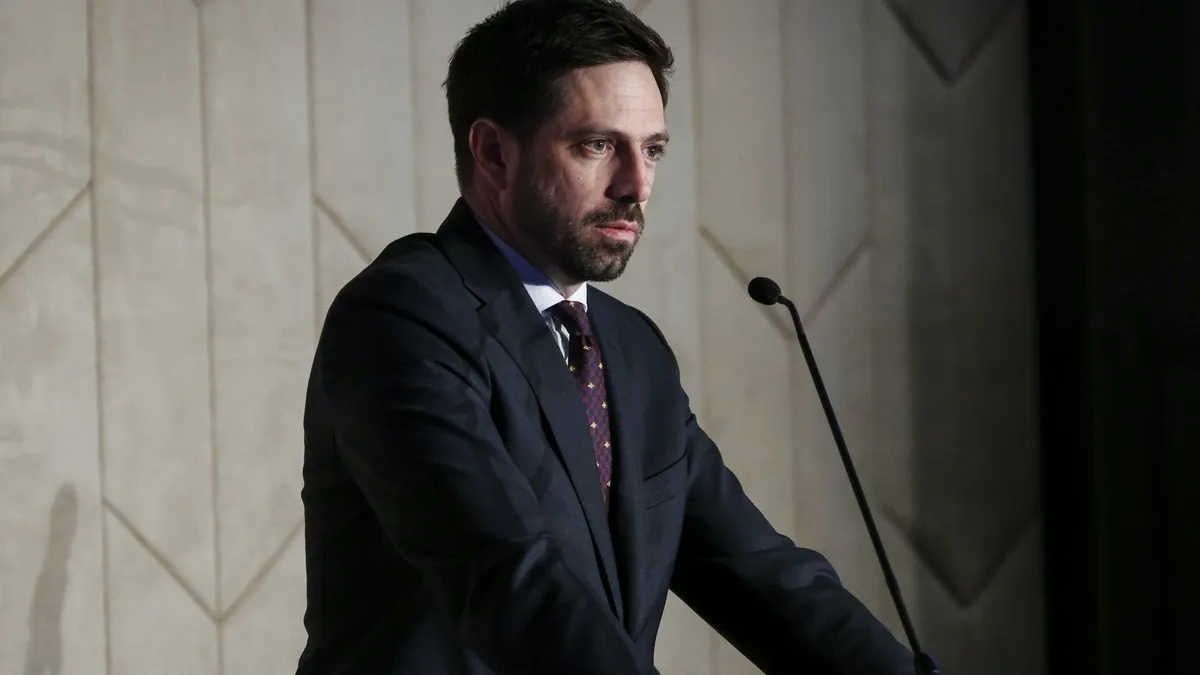Nyilvánosságra került a finnek haditerve: így kerülnék meg Magyarország ellenkezését

Állítólag nincs szükség az egyhangúságra.

„The sooner European leaders realize that the euro, as presently constructed, cannot work, the quicker they will save it” – says John O’Sullivan conservative columnist and political commentator who also served as a senior policywriter and speechwriter for Prime Minister Margaret Thatcher. Hungarian Globe caught up with O'Sullivan during his recent trip to Budapest to participate in the opening of the Cardinal Mindszenty exhibition at the House of Terror Museum. In the interview, O'Sullivan suggests that the euro should be divided into two parts: a southern, soft one and a northern, strong one. He opposes the proposal of Viviane Reding for quotas for women in corporate management and thinks a federal EU would not work. We also got his insights on British politics and the Tories.

Would you explain O’Sullivan’s law, which says: „all organizations that are not actually right-wing will, over time, become left-wing?”
It applies, for example, to Amnesty International. It began as a bipartisan centrist organization, but it grew to be left-wing. Take some of the Catholic charities. They began as Catholic charities, but they often end up striking a series of left-wing attitudes – I’m thinking of organizations like Oxfam. So that’s the law, and it’s based on observation. I’m not sure I can explain why it happens, but nonetheless it seems to be the case.
So you think that these organizations should be right-wing?
Well, in some cases they should be neither right-wing nor left-wing, but simply do what they want to do. For example, if you are an organization of people who collects stamps, well, go on collecting stamps. But you will find that, for example, professional organizations in the United States like the American Bar Association, which used to be an organization that defended the general interests of lawyers and was in favor of such things as legal reform of a non-partisan kind, became an organization with a series of left-wing attitudes. For example, it’s very strongly in favor of abortion rights and against the right to life. Does that opinion unite all American lawyers? No. Is it in the professional interest of American lawyers? No, it isn’t. In fact, many members of the association objected, nonetheless the organization’s central committees and bureaucrats all hold left-wing views, and they impose them on the organization as a whole, and they persuade the rest of the members to go along. All the labour unions are left-wing. But there is no reason for that to be the case. You would expect middle-class unions to be right-wing, but they are not.
Some left-wing activist sympathetic with Labour started a campaign with a T-shirt celebrating the future death of ex-prime minister Margaret Thatcher.
Some silly left-wing socialist and trade unionist made some statement saying that there will be a celebration when Mrs. Thatcher dies. It’s very nasty and unpleasant. Quite apart from the person of Mrs. Thatcher, it is always wrong to celebrate the death of a human being, and we shouldn’t fall into that kind of attitude. But in the case of Mrs. Thatcher, it’s especially ridiculous. I recognize the face of a great opponent. I certainly think, for example, that Mr. Atlee, who was the Labour prime minister after the war, was a great man, even if I disagree with his opinions. Despite where he wanted to take Great Britain - I don’t like many of his most noted achievements, unlike most English people – I recognize a man of quality, decency, goodness and courage in Mr. Atlee. I think Labour supporters should be prepared to do the same for Mrs. Thatcher, even if they disagree with what she stood for. At a pivotal moment in British history, she made great personal sacrifices in order to fight for the right of the country. She showed courage and a certain kind of personal greatness. I think we should celebrate that.
What would happen if Conservatives celebrated the death of a prominent Labour-politician?
There would be outrage, and rightly so. The fact that it hasn’t happened tells you something about the different character of conservative politics and radical socialist politics. I think the difference in this respect is that conservatives recognize politics as only a part of life. There are other things – religion, entertainment, sport – to develop oneself culturally. Conservatives see politics as a means to a good life. Very left-wing people, socialists and others see politics as the good life. For them taking part in politics is the purpose of life. Therefore someone who is on the other side is not simply someone who has different opinions, but someone who is lacking virtue, who is acting wickedly, so you are justified in hating him and calling for his death. As I said, I think conservatives have a more balanced view in this.
What do you think about the Cameron Government?
We have to recognize two things about this coalition. The first is that the Conservative leadership is very much on the left of the Conservative Party. So Cameron and his friends are quite comfortable with their relationship with the Liberal Democrats. In some respects they are more comfortable with Liberal Democrats than their own Conservatives. The second is we do have a divided government in a formal sense. This means that, first of all, most of the measures that the government takes would be measures that have to be acceptable to both parties. Which means they would be, in the main, not very interesting measures. And a number of important things that need to be done from a conservative or classical-liberal standpoint will not be done because the liberals would not support them. It’s particularly true, for example, of anything to do with the relationship with the European Union and euro and so on. Where the Conservatives would like to make changes, Liberal Democrats will block them. So the government is in a state of paralysis.
In order to compensate for this, they occasionally take issues they think will give us an impression of activity and reform in areas such as gay marriage, which is of very little interest to most of the English people. This is a proposal that exasperates people of conservative temperament. All in all, I think the government is a failure, and it is destined to continue as a failure, because they can’t do things that they should do and it compensates by doing what it shouldn’t do.
Who do you prefer to lead the Conservative Party? There was a survey that showed Boris Johnson to be a more popular leader than David Cameron, but Boris declared that he doesn’t want to lead the party.
I’m sure that Boris Johnson wants to lead the Conservative Party and become a prime minister, but he does things in a roundabout way. I think Boris as prime minister would be a very exciting roller coaster ride. He is the only conservative politician who is widely popular and known by just his first name. But he wouldn’t be my first choice. There are two others who are very able. One is the education secretary Michael Gove; another is Owen Paterson, just recently appointed to be environment secretary. Paterson is a traditional conservative with rural experience as a farmer and experience as a financial man in the city. Remember his name. I think you’ll find that he will do something impressive in politics.
What do you think about the recent proposal of Mr. Barroso regarding the federal European Union?
I think the idea of a federal union and a common government that sets up its own army, defense and foreign politics is a delusion for the whole of Europe. In order for such a state to come into being, you need citizens who consider themselves European citizens first and Hungarians, British, French, Italian and so forth second. You don’t have that. In order to have a functioning state that can defend itself financially as well as militarily, you have to have citizens who consider it sovereign. Nations would need overriding common interests. Now, what are the overriding common interest between Finland and Portugal? There are very few things regarding which Finns and Portuguese would say, „Give me my army and let’s go to fight!”
We live in democracies at the moment and we shouldn’t sacrifice these democracies for some new form of oligarchic government, which we’ve never been asked to support, and which couldn’t possibly work. Could it work with a smaller group, with France, Germany, the Netherlands, Belgium, Luxemburg and maybe Italy? Even that would be very, very hard, and would take many years to get it going properly. Politicians in the last thirty years have gotten in to the habit of announcing great plans, and believe that because they announced them, their great plans will take place.
Does the euro have a future?
I would put it this way: the sooner European leaders realize that the euro as presently constructed cannot work, the quicker they will save it. If they allow Greece to part, maybe Italy, also Spain and Portugal, then you would have a currency that could survive. What can we do? Maybe to divide the euro in two, to have a southern euro for Mediterranean countries and a northern euro for Germany and others. And we would allow other countries to decide which to join. Then you would have a hard euro and a soft one. But my proposal would cause great difficulties for one country, namely France. France’s interests would be to join the southern soft euro, but its sense of pride would make it join the northern one. In this case it would be the last country to suffer from the euro problem.
On the continent, to be Eurosceptic is to be linked to the radical right, and being moderate means being in favor of the European Union. English Conservatives take it another way. Why?
England has never been comfortable with the European arrangements. Its legal system traditionally is very different. Its political system is also very different: it doesn’t like coalitions; it likes elections that decide one party in and the other out. So there are a lot of differences. A section of the Conservative Party and also a section of the Labour have always felt that Great Britain was never suitable to be a member of the European Union in the same way as other countries. But my opinion, which used to be a minority opinion, has become a majority one – not in the political class, but within the country as a whole. Now the division is not between Labour and conservatives, but between the political class and the rest of the population. And the difference extends beyond the euro. It also extends to such issues as immigration, crime and economic questions. So what we are going to see in England in the next few years is quite new: maybe the UKIP, the openly Eurosceptic party, will gain a lot of ground, not enough maybe to get into the House of Commons, but enough perhaps to prevent the Conservative Party to get back into government. So the European issue is a live issue, and it represents the gap between the political class and the people. And that’s something new in British politics.
Viviane Reding just proposed compulsory EU quotas of 40 percent women on boards of supervision at listed companies. Do you like quotas?
I think it’s stupid. It’s stupid for this reason: what matters when I appoint a director or a minister is not the sex of the person, but her opinion. I’m not represented by a man who has socialist views. My wife would not be represented by a woman who has left-wing views. I’m represented by Margaret Thatcher and her politics. She expresses my opinions perfectly. The fact that I’m not a woman does not prevent me seeing that there is this community between us. This idea, that quotas take us toward a more democratic system – that all well as long as you bring in a cross-section of society, if you have the right number of women, the right number of men, the right numbers of poor and rich, right numbers of healthy people and people with disabilities, the right numbers of immigrants and various races. This is a Soviet view of democracy. They didn’t have democracy and wanted to suggest that they had representation in a different way. The parliament should be selected by the government to represent people in terms of interest groups. But of course, what happened was that it became the most unrepresentative system imaginable. The members of parliament might have looked different, but they all voted the same way and thought the same way. The concept of democracy based on proportional representation is a fraud. And people who are promoting it know it’s a fraud!
Are you comfortable with your Catholicism in an officially Anglican monarchy?
I always felt perfectly at home in England despite the fact that the state religion is Anglican, also called Anglo-Catholic, but it’s a moderate protestant religion with many Catholic features. It has never made me feel like a foreigner that I was Catholic. And I think that all those kind of feelings disappeared with the Second World War. People realized that they are all English. These differences of religion might be important in the next world, but in this world, they shouldn’t get in the way too much. I think that is the case today. I’m sorry, but the decline of religion in general in Britain as in the rest of Western Europe is a bad thing, and I would prefer to live in an England that was officially Anglican than in an England that had no religious identity at all. Just as, for example, if I were Protestant or Jew or Buddhist in Hungary, I would have been perfectly happy to live under a constitution that said the country is specifically Christian. I have to give credit to the English and American Protestants. They were pioneers of the language of liberalism. Within England and the United States, the Catholic Church saw the wisdom of liberal ideas, which included religious freedom. And they became political Protestants and Catholics. And in turn, at the second Vatican Council they changed the American Church. And the American Catholic Church accepted religious freedom in an unmistakable way in the sixties. So we all live in the modern western world under the regime of religious tolerance, whether the state is officially secular like the USA or extravagantly secular as is France, or whether it is a confessional state, as is England.











